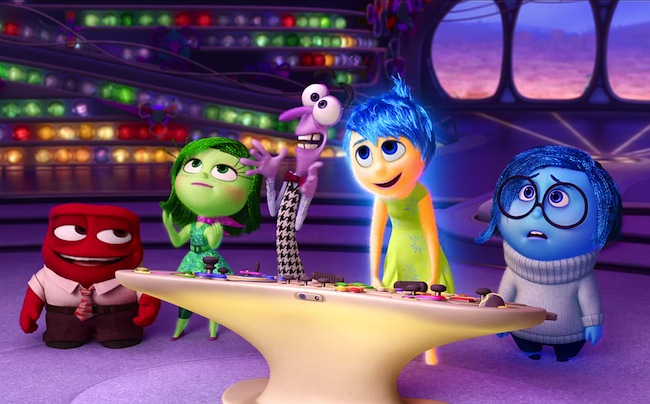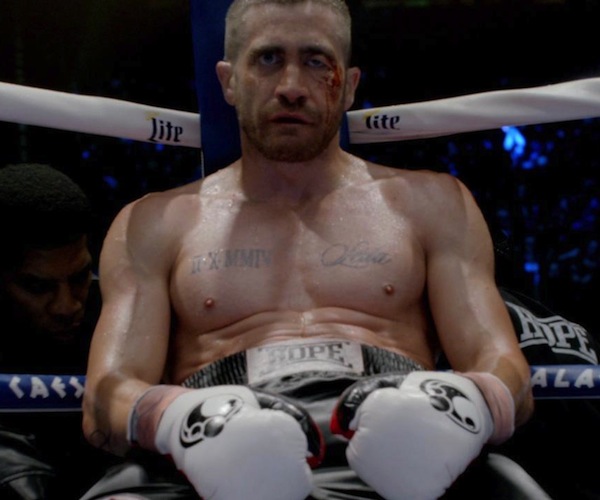Fuse Film Review Round-up: “Inside Out,” “Amy,” Southpaw,” and “Self/less”
A quartet of summer films that range from the excellent to the not-so-bad and the ugly.
Boston Area Film Schedules — What is playing today, Where and When
By Tim Jackson

The psychic protagonists in “Inside Out.”
Inside Out
The story sessions for this film must have been a hoot. Like Toy Story 3 and Up (also written and directed by Pete Docter), Pixar dazzles us with elaborate images, inventive twists, and winking comic references. The story is about an 11-year-old girl named Riley who is anxious about her family’s move from rural Minnesota to San Francisco. We see and hear her conflicting emotions through psychic ‘characters’ — Anger, Disgust, Fear, Sadness, and Joy — who live inside her, and everybody else’s, head. Docter takes a chance with an abstract idea and turns what could have been merely cute into an astonishingly creative work of art that explores genuine ideas about how emotion shapes perception and communication. I saw it in 3-D in a theater filled with kids and their parents. The smallest children were dazzled by the ingenious sequences and the affecting voice acting in a cast that includes Phyllis Smith as Sadness, who challenges Amy Poehler’s Joy, who keeps Lewis Black’s Anger in check. As the anthropomorphized critters rattle though Riley’s brain they process experiences and emotions that will be familiar to older kids. Adults will identify with the coming-of-age story and be pleasantly surprised by some of the more nuanced looks at the nature of friendship, identity, memory, and the way we process emotions. The most abstract sequence is a visit to the room of “non-objective fragmentation” where our psychic progagonists are slowly transformed into abstract shapes. The useful takeaway for both kids and adults — being sad, angry, fearful, and overwrought are the best parts of being human.
Amy
Amy Winehouse was possibly the most gifted jazz/soul singer to come along in decades and her passing was a tragedy, an incalculable loss to music. This new documentary is about her life, rise to global adulation, and death at the age of 27. She was born with a number of impressive gifts: a a smoky voice and insouciant attitude, an ability to work a phrase or even a single word into a sophisticated jazz riff, and a knack for writing bold and personal lyrics based on her experiences. She also created a clever retro image to package her skills. She was, as the film makes clear, an old soul in a young person’s body: “She could drink like a man, tell a blue joke.”
Winehouse seemed to explode fully formed onto the world stage, rare and splendid at 21, and the press was waiting and hungry. She was raw meat for scandal hungry journalists and the manic paparazzi. The problem was that her tough working-class roots and seeming self-assurance covered a deep (and crippling) insecurity. (The segment in which Winehouse sings a duet with her idol Tony Bennett will make you weep.) She predicted that if she became too famous it could “drive her mad” — and she was right. She was a talented musician and a gutsy personality who she couldn’t withstand the tidal waves of public curiosity and adoration. Winehouse was too insecure to survive the media’s ominpresent feeding frenzy. Amy is an insightful and respectful look at Winehouse as an artist as well as being an inditement of the mad and bad media.

Jake Gyllenhaal — beat to an existential pulp in “Southpaw.”
Southpaw
Antoine Fuqua is a tough-ass director who casts sturdy actors in service to testosterone driven uber-dramas, The Equalizer (Denzel Washington takes on Russian gangsters) and Brooklyn’s Finest (Richard Gere, Don Cheadle, and Ethan Hawke plays cops) among them. Here he combines the brutality of middle-weight boxing with a heapin’ helpin’ of redemption. Jake Gyllenhaal, a performer who has committed his body and soul to films as varied as Jarhead, Brokeback Mountain, and Nightcrawler (and gave a fine performance this season on Broadway in the play Constellations) goes to edgy emotional and physical extremes in Southpaw. He plays a very rich but endlessly battered and bleeding championship boxer who loses everything and goes in search of his soul.
The Raging Bull style boxing scenes put you right in the ring. The bouts are downright ferocious, and Gyllenhaal is alarmingly fit and full of fury. His character, the too aptly named Billy Hope, suffers through inconceivable losses and then struggles to find the true meaning of life with the assistance of a Ghost Dog style trainer played by none other than Forest Whitaker. The film’s themes and ideas are writ and lit in gigantic neon, but these actors commit to this guff with such integrity and grit it suckered me in. Like Million Dollar Baby, Southpaw is boilerplate as drama, but the physicality of the filmmaking and some good performances may sweep you up.
Self/less
This film doesn’t redeem what must be one of the least memorable titles of the year. The visually inventive director Tarsem Singh (The Fall, The Cell, Mirror Mirror) has been handed a script by Alex and David Pastor (Carriers) that devolves from high concept to action movie clichés. An entitled-to-the-max billionaire named Damian Hale (Ben Kingsley) finds that he has cancer. For a lot of cash, a mysterious organization agrees to let him undergo “shedding,” an expensive procedure that will transfer his consciousness into the hot young body of Edward (Ryan Reynolds). After challenging physical therapy in his new body, Hale is buff and ready for action, which he gets plenty in his new life in New Orleans. But his hallucinations and headaches can only be kept at bay with special pills provided by his mysterious host, Albright (played by Matthew Goode, as if the guy was a nattily attired and wooden Dr. Evil). The potential for intriguing questions to be raised about the desirability of immortality and existence of the soul is reduced to fist fights, chases, and last minute getaways. Singh does little to spice things up visually. Natalie Martinez, as the former wife of the “real” Edward is great eye candy, but she is given little to do but run, run, urn away from bad guys.
Tim Jackson is an assistant professor at the New England Institute of Art in the Digital Film and Video Department. His music career in Boston began in the 1970s and includes some 20 groups, many recordings, national and international tours, and contributions to film soundtracks. He studied theater and English as an undergraduate and has also has worked helter skelter as an actor and member of SAG and AFTRA since the 1980s. He has directed a trio of documentaries: Chaos and Order: Making American Theater about the American Repertory Theater, and Radical Jesters, which profiles the practices of 11 interventionist artists and agit-prop performance groups. His third documentary, When Things Go Wrong, about the Boston singer/songwriter Robin Lane, with whom he has worked for 30 years, has just been completed. He is a member of the Boston Society of Film Critics. You can read more of his work on his blog.
